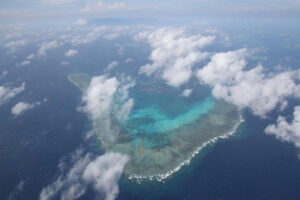Why Europe is a useful ally in the WPS territorial disputes
Tensions between the Philippines and the People’s Republic of China remain high, with both countries continuing to skirmish and posture within the disputed territories in the West Philippine Sea (WPS). On Sept. 30, the Philippines held joint naval exercises alongside Australia, Japan, New Zealand, and the United States, under the auspices of Multilateral Maritime Cooperative […]

Tensions between the Philippines and the People’s Republic of China remain high, with both countries continuing to skirmish and posture within the disputed territories in the West Philippine Sea (WPS). On Sept. 30, the Philippines held joint naval exercises alongside Australia, Japan, New Zealand, and the United States, under the auspices of Multilateral Maritime Cooperative Activity (MMCA). According to an Armed Forces of the Philippines spokesperson, the participating vessels were “tailed” by the Chinese navy. Although the incident did not result in any direct confrontations, it is evidence of the tense situation in the WPS.
The presence of ships from four other countries is a manifestation of the Philippines’ efforts at deepening security ties with its neighbors and traditional allies. This includes the signing of the Japan-Philippines Reciprocal Access Agreement (RAA), and the call to review the US-PH Mutual Defense Treaty (MDT).
Although the Philippines continues to rely on its allies in the Asia-Pacific region to boost its naval presence in the disputed territories, this column argues that the country should recognize and harness the diplomatic support the country receives from European states.
Europe may be geographically distant, and many of its states are focused on the Ukraine invasion, but the region continues to follow occurrences in the South China Sea. This is evident when one considers the public pronouncements of the European Union (EU) and its member states, such as Denmark, France, or Germany. It is also manifested in statements issued by non-EU countries, such as Norway and the United Kingdom. Since the 2016 decision by the Permanent Court of Arbitration in the Hague, which recognized the Philippine territorial claims in the WPS, European countries have expressed support for the Philippines against Chinese incursions into the disputed area. Of particular significance was a 2023 joint statement by EU and member state delegations in the Philippines recognizing the legitimacy of the arbitral award and emphasizing support for the freedoms of navigation and overflight, which are enshrined in the United Nations Convention on the Law of the SEA (UNCLOS).
Since the promulgation of the tribunal’s decision, skirmishes have continued in the disputed territories. Some noteworthy incidents include a Chinese vessel’s use of a military grade laser to blind Philippine sailors, which resulted in a diplomatic rebuke from Malacañang, as well as statements of opposition from the Swedish and Danish embassies in the Philippines. In March of this year, the Polish mission to the Philippines expressed its opposition to China’s ships blocking the movement of Philippine vessels, even using water cannons to deter them.
Although European actors’ statements may appear to be mere lip service, their statements are exercises of what International Relations scholars generally refer to as soft power. Such articulations may appear relatively ineffective compared to the sending of ships, as the US or Japan do, but they are ways to express opposition towards Chinese actions, and support for the Philippine position.
Apart from abstract articulations of support, however, recent developments have allowed for Europe to provide more material support to the Philippines. For example, the EU published its Strategy for Cooperation in the Indo-Pacific in 2023, which reconfigures the forms of cooperation between the 27-country bloc and countries, such as the Philippines. Initial results of this include the establishment of the EU-Philippines Subcommittee on Maritime Cooperation, the adoption of the EU-funded Indo-Pacific Regional Information Sharing (IORIS) Platform, and the provision of more crisis management exercises through the Critical Maritime Routes Indo-Pacific (Crimario) project. Each of these instruments deepen the EU’s involvement in the Sino-Philippine territorial dispute.
Beyond its engagements with the EU, the Philippines likewise has sought to strengthen its bilateral ties with individual European states and diversify its portfolio of security partners in responding to Chinese hegemonic ambitions. In this year alone, some of the agreements in the works include: 1.) a draft military interoperability agreement with France, 2.) the finalization of a defense cooperation pact with Germany, and, 3.) the signing of a security agreement with Sweden allowing the Philippines to procure fighter jets and Swedish-made defense equipment. Other initiatives from previous years include French participation in the “Balikatan” exercises, the deepening of defense cooperation with the Netherlands and Poland, and the visit of two German warships to the Philippines, among others.
Although efforts are underway to deepen European involvement in the Sino-Philippine territorial dispute, there is potential to build more areas of cooperation. The construction of a more robust security posture for the Philippines entails looking beyond our traditional allies in the Asia-Pacific region, and tapping into the potential for more consistent material European support. This is feasible considering the EU and individual European states’ records as reliable economic and security partners for the Philippines. Thus far, Europe has provided diplomatic support to the Philippine position in the territorial dispute, and there are nascent initiatives for deeper cooperation. However, these can be intensified further. The Philippine National Security Strategy can benefit from building upon its existing partnership with the EU and other European states.
Dr. Manuel R. Enverga III is the Jean Monnet chair and director of the European Studies Program at the Ateneo de Manila University. His teaching and research are focused on the areas of EU-Philippine relations, digital diplomacy, and global flows. He also hosts The Eurospeak Podcast, where he invites guests to talk about European influences on contemporary popular culture.
Vincent Carlo L. Legara currently works as a lecturer at the European Studies Program and at the Department of Political Science of the Ateneo de Manila University. He is also a junior political risk and security analyst for Polysentry.














